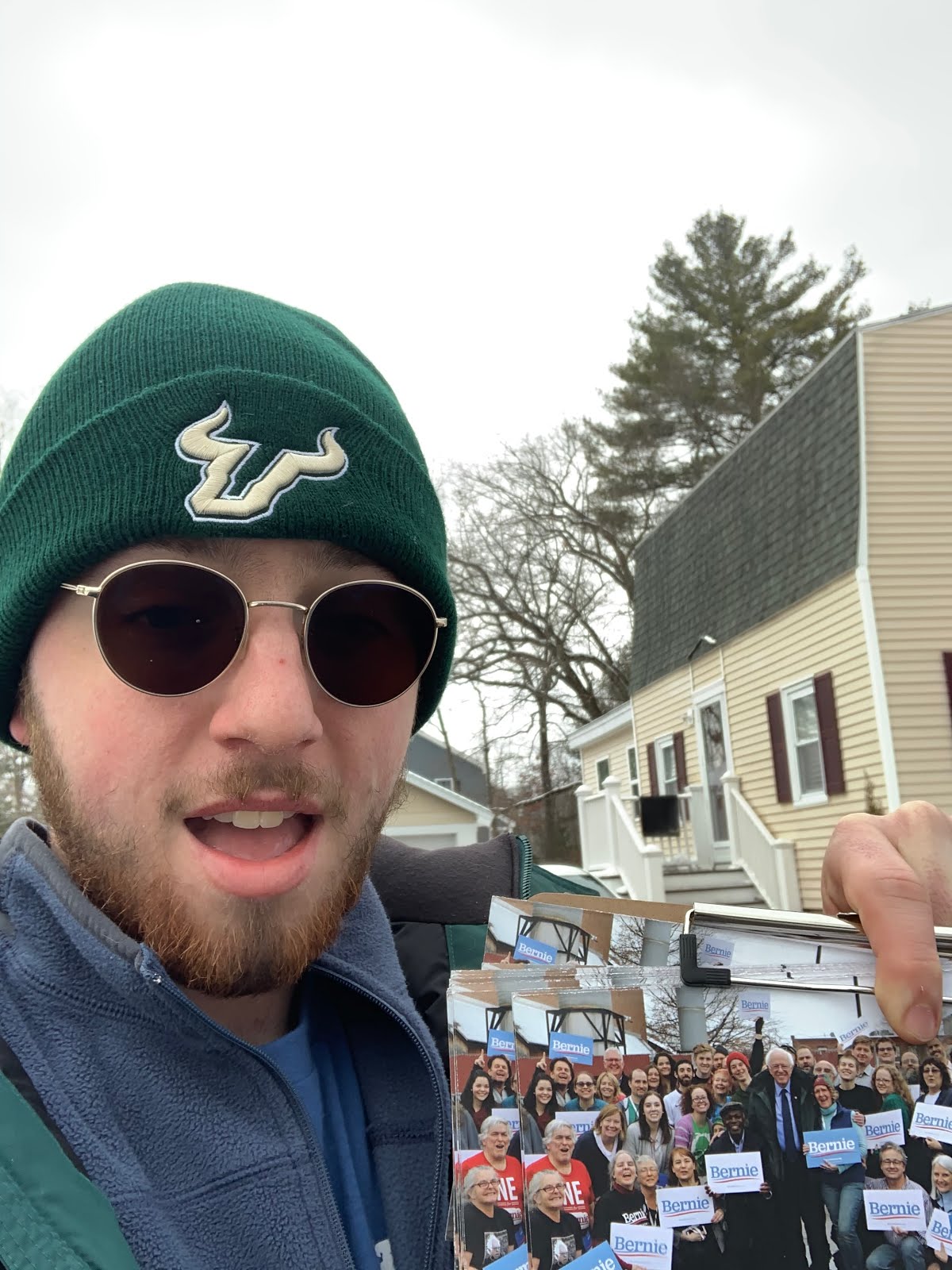
The end of the road: Students reflect on New Hampshire primary experience
Pictured above: Martindale poses in a New Hampshire neighborhood while canvassing, holding up a stack of promotional photos for Senator Bernie Sanders, I-Vermont. Courtesy Trevor MartindaleBy Dylan Hart
It was a freezing February day in New Hampshire. Jacob Terrell, undeterred by the bitter cold and rain, knocked on a door that he would never forget.
An elderly woman came to the door and invited him in. They spoke about the upcoming political primary by the fire, with tea in hand, for almost half an hour. Terrell pitched his candidate, Elizabeth Warren, to the woman. She was a stranger to Terrell, but her warmth and hospitality still shined through.
“That’s something I’m going to take with me for the rest of my life,” Terrell said. “It was the American experience.”
Terrell was one of 29 students on the Road to the White House, an intensive political science course that takes students to New Hampshire for 10 days surrounding the primary election. Students picked their candidate and volunteered on their team, knocking on doors and calling phones alongside attending classes, forums and meetings.
Terrell, along with students Jadzia “Jazzy” Duarte, Trevor Martindale, Haley Hobbs and Andrea Rodriguez Campos, shared experiences from the New Hampshire snow to attendees at the Bay-to-Bay faculty symposium on Feb. 14.
The students took a lot of lessons home with them from the election, whether their candidate won or lost. While the six panelists were all politically involved before traveling to New Hampshire, they all felt that the experience fundamentally changed their understanding of the political process.
“They can read about the New Hampshire primary, they can watch things on the news, but I really wanted to take them to experience it for themselves,” said professor Judithanne Scourfield McLauchlan. “It’s electrifying in a way that’s hard to describe.”
Duarte, who campaigned for Sen. Amy Klobuchar, D-Minn., said that Scourfield McLauchlan telling students that they would be getting up at 6 a.m. to walk in the snow and getting back at midnight every day wasn’t an exaggeration. Still, she learned a lot from the class.
“You saw how intense the campaign offices were and how into the field everyone was getting,” she said.
She was also struck by the sheer number of people she met while volunteering, between voters and politicians. It motivated her to “be even more involved in politics,” she said.
One rare facet of the campaign was the high number of undecided voters on election day, said Scourfield McLauchlan. This led to a lot of long talks with voters for students.
Martindale, who campaigned for Sen. Bernie Sanders, D-Vermont, recalled a passerby rolling down his window upon hearing Martindale’s team discussing Sanders. It turned into a long conversation where the voter told the team his life story.
The state’s size gives the primary a close-knit feel that can’t be captured in Florida, said Rodriguez Campos, who also campaigned for Sanders.
There was a recurring joke in New Hampshire, she said, that followed, “‘I’m not sure if I’m going to vote for Elizabeth Warren, I’ve only met her twice.’ It shows New Hampshire politics in a nutshell.”
The students on Sanders’ team saw him so many times that by the end, they were reciting his speech from memory, Rodriguez Campos said.
The students’ experiences went beyond campaigning. Everyone met candidates Pete Buttigieg, Tom Steyer and Amy Klobuchar. They also met “media stars” like Kevin Costner and Michael J. Fox. Duarte and another student on the Klobuchar campaign even got free tickets to the Feb. 7 debate in Manchester, New Hampshire.
“I’ve said it before and I’ll say it again: It was the best 10 days of my life,” said Haley Hobbs, who worked for the Pete Buttigieg campaign.
No comments:
Post a Comment